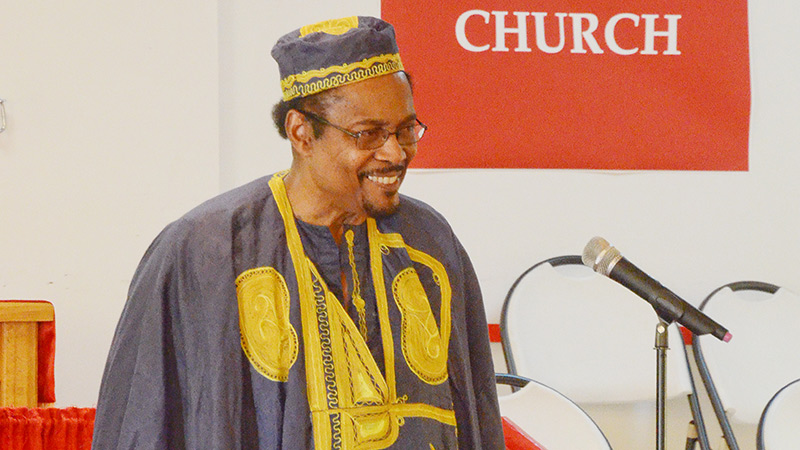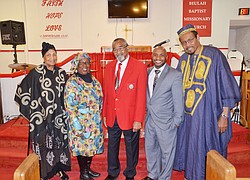Youngstown pastor traces ongoing path of civil-rights movement in United States

By SEAN BARRON
YOUNGSTOWN
The U.S. is experiencing a variety of painful connections between the civil-rights struggles in the South decades ago and many of today’s ills. But a strong faith in God combined with doing good works remains the remedy, a local minister contends.
“I grew up in a segregated community [in Alabama], and I never went with anyone to school who was white,” the Rev. Henry McNeil recalled. “I never had a white teacher. That was the law.”
The Rev. Mr. McNeil discussed certain aspects of the civil-rights movement, including where he feels we are as a nation and where we need to go, during a program Sunday afternoon at Beulah Baptist Church, 570 Sherwood Ave., on the South Side.
The 90-minute presentation and sermon were part of Black History Month.
Black History Month Discussion at Beulah Baptist

A Black History Month discussion on the Civil Rights Movement was held at Beulah Baptist Church on Sunday, February 25, 2018. Rev. Henry McNeil from Elizabeth Missionary Baptist Church spoke on the fallout from the Civil Rights Movement of the 1960s, where we are now, and what we need to do in the future to ensure equality for all people of color. Beulah Baptist Church is located at 570 Sherwood Avenue in Youngstown. Rev. Jeffery Stanford is the pastor of the church. Photos by Scott R. Williams.
In his famous “Letter from Birmingham Jail” in April 1963, Dr. Martin Luther King Jr. addressed the concerns of eight prominent Alabama clergy members who had issued a statement saying they sided with his attempts to attack segregation and injustices, but called his methods “extreme” as well as “unwise and untimely.” Nevertheless, King did his greatest work with Jesus Christ’s guidance, Mr. McNeil explained.
Similarly, Christ’s love was pivotal in Rosa Parks’ civil-disobedience efforts that sparked the famous 381-day Montgomery Bus Boycott, which began soon after her arrest Dec. 1, 1955, in Montgomery, Ala., for refusing to surrender her seat to a white man, Mr. McNeil said. He also noted that about 42,000 blacks had joined the protest eight days after Parks’ arrest.
“She was standing for what was right,” he said, adding that King helped save the U.S. so it “would not come apart at the seams.”
He also praised the work of the NAACP, the country’s oldest civil-rights organization that was founded Feb. 12, 1909, mainly by several white liberals after a deadly race riot a year earlier in Springfield, Ill. The longtime organization, which has done most of its work through the legal system, was crucial in aiding other civil-rights groups, and it acted as “champions of the underdog where race was concerned,” Mr. McNeil said.
He also read several passages from the Book of Habakkuk, which in part discusses the Prophet’s complaint to God that Judah was filled with injustice, as well as God’s decision to have the Babylonians punish the people of Judah. Habakkuk counters, however, by saying that the Babylonians are worse sinners that the people of Judah.
Mr. McNeil used the passages as a tie-in to some recent suffering, punishment and injustices, including to those who have been affected by the Feb. 14 massacre at Marjory Stoneman Douglas High School in Parkland, Fla., in which 17 students and staff were killed.
Along those lines, automatic weapons should be done away with. Doing so will not violate the Second Amendment, the minister continued.
Mr. McNeil also lambasted what he sees as efforts to tear down President Barack Obama’s legacy that included more inclusive and affordable health care plans for a greater number of people. Instead, too much of an emphasis is now on the misguided notion that “helping the rich is the best way to help everyone,” he told the congregation of several dozen.
The nation is in poor shape mainly “because we’re on a path to taking God out of everything,” he continued.
Mr. McNeil urged the congregants to continue performing good and unselfish works, yet always maintaining a strong faith in God.
“Give it to the lord, that’s what you need to do,” he said. “He will take care of it for you.”
Mr. McNeil also advised attendees to be mindful of their family members’ best interests, which includes making out wills and having sound life-insurance policies.
 43
43
